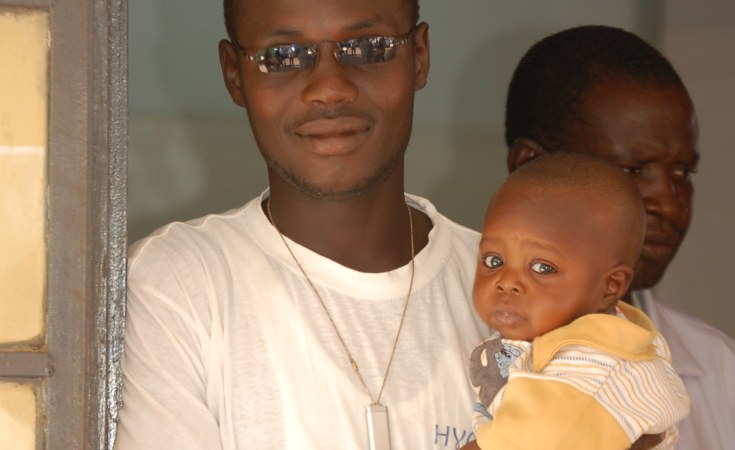Oyin Gucci is a Nigerian woman whose Twitter profile reads, "I am simple. Was once a mother". A few days ago, she shared the sad story behind her bio. In a series of tweets, she narrated how she lost her nine-month-old son a few months ago due to negligence by a doctor at the General Hospital Ikorodu, in Lagos State, Nigeria.
She shared how her son suffered from "an attack" at 3 a.m. on July 19 and she rushed him to the General Hospital Ikorodu. A nurse on duty met them, but the doctor on-call was absent, his phone switched off, and so the nurse said there was little she could do for the ill child besides place him on oxygen.
Gucci tweeted how two hours later; the doctor strolled in leisurely, unperturbed. He acted as if there was no emergency and did not offer any direct treatment to her son. Instead he wrote some prescriptions for Gucci to buy and left for the mosque to pray. Thirty minutes later, he returned and attended to other patients. Gucci felt these other cases were not as serious as her son's, whom she could see was struggling and struggling to breathe. Ultimately, tragically, her son died more than 6 hours after arriving at the hospital.
Such cases of negligence are quite common in low- and middle-income countries. A 2017 survey on medical errors in Nigeria with 145 medical practitioners showed a prevalence of 42.8%. The three most common errors were error of medication prescription (95.2%), error of radio-laboratory investigation ordering (83.9%), and error of physician diagnoses (69.4%).
In Nigeria, two cases of negligence stand out to me. In 2014, Folake Oduyoye was detained at the Lagos University Teaching Hospital (LUTH) after she could not pay almost $3,000 left from her bill for her caesarean section. Later she grew ill and was not cared for under detention. She died from complications of puerperal sepsis and pneumonia. My Nigeria Health Watch colleague Patience Adejo and I wrote about a second case. Dr. Rosemary Chukwudebe was a 42-year old doctor, a mother of three, an asthmatic and the Head of Internal Medicine at the Kogi State Specialist Hospital in north central Nigeria. In 2018, she was rushed to the hospital during an asthma attack and she died in the same unit she headed because oxygen could not be administered timely – there was no wrench to turn on the oxygen cylinder.
Of course, this is not just a problem in Nigeria. In South Africa, for instance, payment for medical negligence claims in KwaZuluNatal were higher than amount budgeted for in 2018. By mid-2018, the KwaZuluNatal Department of Health had spent almost $9 million.
Gucci is clearly and understandably heartbroken over the death of her son. Her joy is stolen, and as her Twitter profile reads, she is no longer a mother. No mother should have to undergo such a traumatic experience of watching her child die. These are four ways to ensure Gucci gets justice and such negligence never happens again.
First, the Management of the General Hospital Ikorodu must investigate this case of negligence. Because it involves a doctor, the case should be reported to the Nigerian Medical and Dental Council. It is exemplary that already the Lagos State Commissioner of Health, Professor Akin Abayomi has consoled Gucci and asked for her contact details and the exact date the incident happened, to enable him to conduct a proper investigation. This investigation must be conducted thoroughly, and the result made known to Gucci and her family. It must state clearly the ways Gucci can seek redress. This case has attracted social media attention. Therefore, the result of the investigation must also be made public so that other health workers would be deterred from abandoning their duty posts to the detriment of patients.
Second, introduce patient-centered care curricula in medical schools and other schools training health professionals. The current training of health workers in Nigeria does not profile the patient (client) as the most important member of the health system. This must change. Healthcare must meet Picker Institute's eight principles of patient-centered care developed by the Harvard Medical School. These are, respect for patient's preferences; coordination of care; information and education, physical comfort; emotional support; involvement of family and friends; continuity and transition; and access to care.
Third, governments, civil society organisations and legal aid associations must keep educating communities about their rights and how to seek redress when the need arises. In such forums, health workers should be present so that relationships between caregiver and clients are developed even before the need for healthcare.
Fourth, government must invest in recruiting more doctors and other health workers. A situation where one doctor is on-call is unacceptable and dangerous. However, doctors are leaving Nigeria in droves. A 2017 survey on emigration of Nigerian medical doctors by Nigeria Health Watch and NOI Polls identified reasons why Nigerian doctors choose greener pastures elsewhere. The reasons include, low work satisfaction; poor salaries and emoluments; poor treatment by government; poor quality of practice; poor working environment, insecurity etc.
Sadly, the death of Gucci's son was preventable and should not have happened. Let her son's case be the end of medical negligence in Nigeria. Gucci deserves justice.
Dr. Ifeanyi M. Nsofor, is a medical doctor, a graduate of the Liverpool School of Tropical Medicine, the CEO of EpiAFRIC and Director of Policy and Advocacy at Nigeria Health Watch . He is a 2019 Atlantic Fellow for Health Equity at George Washington University, a Senior New Voices Fellow at the Aspen Institute and a 2006 International Ford Fellow. You can follow him on Twitter @ekemma.


